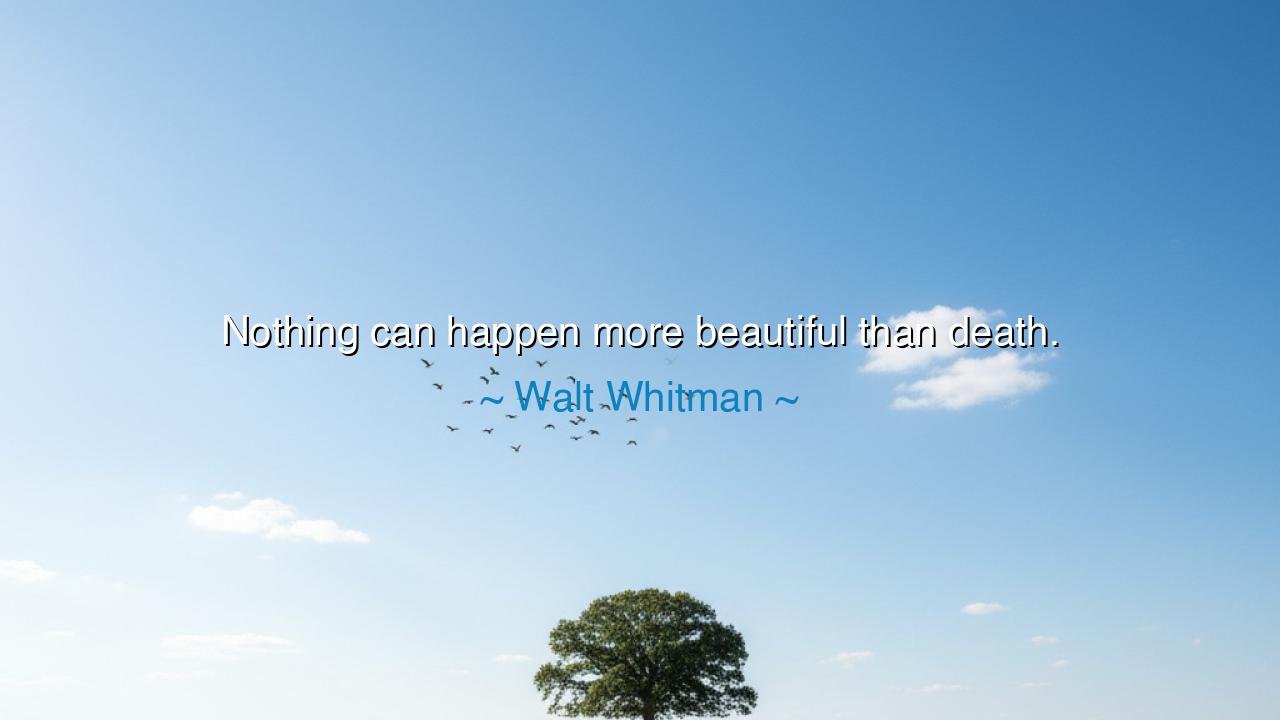
Nothing can happen more beautiful than death.






“Nothing can happen more beautiful than death.” — thus wrote Walt Whitman, the poet of the soul and the body, the singer of the open road, and the prophet of life’s eternal cycle. In this brief and startling line, Whitman does not celebrate darkness, nor glorify loss; rather, he speaks of death as the crown of existence, the final and most profound transformation of life. To him, death is not a terror to flee from, but a gateway through which the soul passes, returning to the great river of being from which it came. His words are both daring and tender — an invitation to see beauty not only in birth and living, but in ending and renewal.
Whitman’s thought was shaped by the wisdom of both the East and the West, and by his own tender experiences tending to the wounded and dying during the American Civil War. He saw death not as the annihilator of life but as its completion. To those who suffered, he offered not pity, but peace — for he saw in their final breath the same mystery that flows through the leaves of a tree, the waves of the sea, and the stars of night. In his great work Leaves of Grass, Whitman celebrated oneness, teaching that all things — joy and sorrow, life and death — are but verses in the same eternal poem. His declaration that “nothing can happen more beautiful than death” is therefore not morbid, but sublime — the vision of one who has seen through the veil and found harmony even there.
To the ancients, this vision would not have seemed strange. The Greeks told of Thanatos, the gentle god of death, twin brother to Hypnos, the god of sleep. They did not fear him, for he came softly, as rest after labor. In the East, too, the sages of India and China spoke of death as return, the shedding of form that the spirit might move onward. In this way, Whitman’s words echo the oldest wisdom: that death is not destruction, but transformation. The flower falls, but the seed endures. The sun sets, but only to rise again. What we call death is but life wearing a new face.
There is a story that illuminates this truth — the tale of the Japanese samurai Kiyomori Taira, who, after a life of great power and conquest, fell ill and lay dying. When asked if he feared death, he said, “No, for the cherry blossom falls when it is most beautiful.” He saw his end not as punishment, but as perfection — the final note of a melody that had been sung fully and bravely. So too did Whitman see death as the flowering of life’s meaning, not its loss. To him, the most beautiful thing that could happen was not to cling to form, but to become part of the vast, unending rhythm of existence.
Yet Whitman’s teaching is not a call to hasten death, nor to romanticize suffering. It is a call to live so completely that death itself becomes a natural continuation of living. Only those who have truly embraced life can face death without fear. For the one who has loved deeply, worked honestly, and seen the beauty in every breath, death no longer seems an intruder, but a long-awaited friend. This is why Whitman could write with peace, even joy, about what most men dread — because he had already made peace with impermanence.
In his vision, beauty is not limited to what pleases the eye, but includes all that is true and whole. Death, in its quiet dignity, restores balance. It humbles the proud, it heals the weary, it completes the unfinished. It reminds us that nothing — not pain, not joy, not even loss — is wasted. Every tear, every heartbeat, every farewell is gathered into the eternal dance of life and death that Whitman saw so clearly. And in that dance, there is no ending, only continuation, the endless unfolding of the spirit.
Therefore, my child of tomorrow, let this be your lesson: fear not death, but the unlived life. Embrace every day as if it were your first, and cherish every parting as if it were your last. See in every sunset the promise of another dawn. When death comes — as it must to all — let it find you not clinging, but ready, radiant with gratitude for the miracle of being. For if you have loved, if you have created, if you have lived with wonder, then your passing too shall be beautiful. And as Walt Whitman taught, nothing can happen more beautiful than death, for it is not the end of the song — it is the moment when the melody joins the eternal music of the universe.






AAdministratorAdministrator
Welcome, honored guests. Please leave a comment, we will respond soon